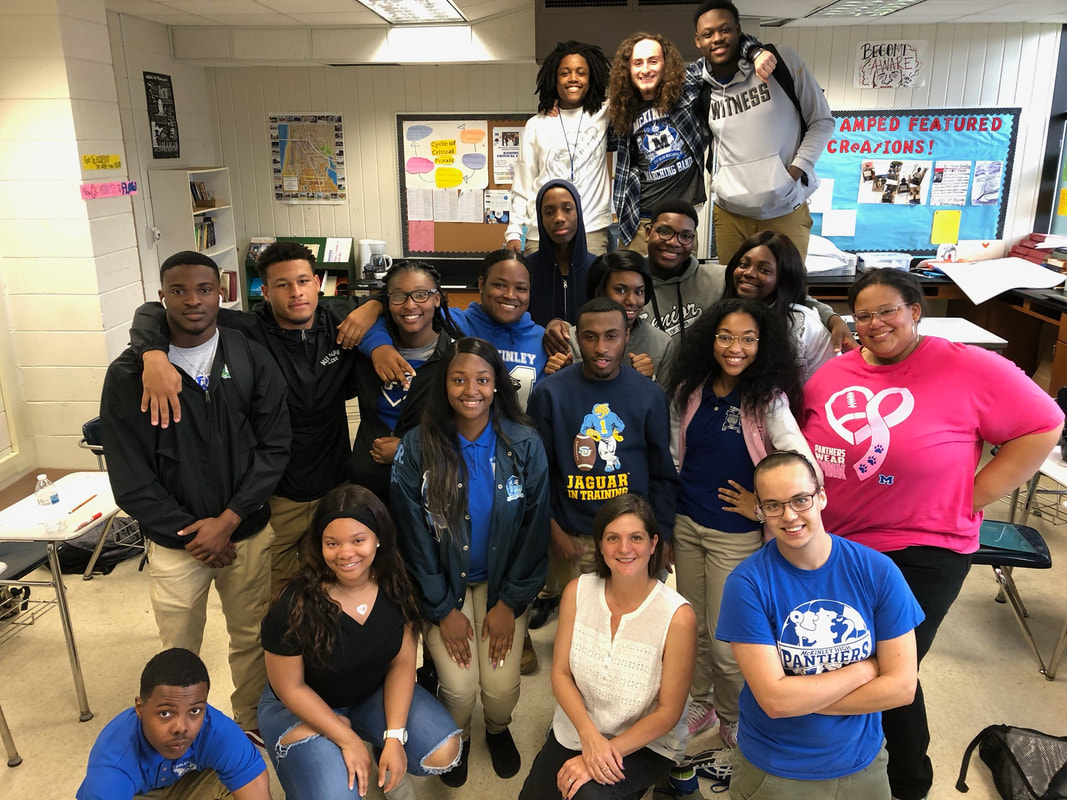|
Humanities Amped students learn the value of reflection not only through practicing it themselves but by seeing their instructors and leaders model the process. As we reflect on the 5th year of Humanities Amped and look over the reflections our students wrote after this year’s conference, we want to share some key lessons that we saw emerge so that you can be part of this learning community with us. The "roots” metaphor invoked in the conference title this year pays homage to the late Grace Lee Boggs, a Detroit-based philosopher and community organizer who believed that in living systems, change requires critical connections, a myriad of small-scale actions, and the planting of many seeds. Boggs argued that our current system of education is failing youth in urban centers, where dropout rates are typically 30% and higher. In these circumstances, Boggs believed that education needs to be recreated to “provide children with ongoing opportunities to exercise their resourcefulness to solve real problems for their communities” (2012, p. 137). We see Humanities Amped as a learning community for people who are exploring exactly that kind of democratically-engaged learning. Here’s what we have learned about “Resilient Roots”: Lesson #1 Rodolfo, an English learner explains, "I will never forget that it was my first presentation in English. When I went to present at the front, I had a great motivation to meet that challenge. Knowing that I have that support from teachers makes me not want to give up. I have a great appreciation for the way they teach us with great dedication and infinite patience." Natalie writes, “Moments that stood out to me during the conference was how everyone was very serious about their topic. Also how they were able to connect with each other. It was a very emotional conference. It made me learn things about my classmates I didn’t know.” Brianna says of the process of working collaboratively with a group, “Just witnessing and going through so many problems and different emotions [with my group], at first not really being that close, and now being good friends. I believe this project brought us closer together.” Lesson #2 Lauryn explains why it matters for youth to be positioned as active participants: “Young people need to be the ones [to work on these problems] because people understand and want to change problems that affect them the most. Students know what problems affect them every day. When you give them the tools, they can build.” Jaden states, “[When our group’s action proposal was mostly turned down] all I felt was a wave of anger and failure. I felt that all the time we spent carefully planning out that entire week was wasted and that it was all for nothing. Then a group member and a close friend of mine told us that we shouldn’t be taken down by this. That we should take advantage of what they gave us and use that one day as much as we could. After she said that, all I could feel was determination to make this limited time work, even if we had to re-work our entire action project. And that’s what we did.” Kadajaisha adds, “I feel like seeing young people trying to change things about the world inspires adults, because most adults believe that young people don’t care about their community, so seeing a young person make a change is a mindset change for adults.” Lesson #3 Madison says, “Knowing that we thought we wouldn’t finish in time then actually finishing stood out to me. I learned to never doubt yourself. Be yourself, anything you put your mind to you can do it; don’t let anyone tell you different” Carlyle adds, “The legacy I want to leave for future students at McKinley is that anything is possible.” Jai explains, “The legacy I want to leave for future students at McKinley is to not be afraid to be a leader. You have to step out on faith and believe that you can do it and will do it, because if you don’t have faith that you will accomplish it, no one else will.” Finally, Alejandra, a 9th grade English Learners explains, "After the conference, I felt proud and happy with myself because just trying to speak English with everyone at the conference was a challenge that I met. Now I know I can do anything and talk to other people in English. I feel like I have more confidence to do so, and that's why I am so proud and happy." Humanities Amped Restorative Justice Elective led by teachers Destiny Cooper and Sam Biddick We have always thought about Humanities Amped as a concrete model of possibility for what education can be, a space for teachers, students, and community members to learn together how we can build a world that we truly desire. We are grateful to East Baton Rouge Parish School System for investing in this unapologetically public education with us. We also want to shout out our many incredible partners at Louisiana State University who understand how important it is to not only theorize about it, but to be about it. We’re grateful for the help of the McKinley Alumni Center, Brothers Empowered 2 Teach, Andover Bread Loaf, the Miremont family, the Leavell Haymon family, all of our donors large and small, and the myriad other organizations and individuals who have gone far beyond the call to raise our children with the highest hopes possible. We close this letter with the vision of Quan’Tyrian, an 11th grade Humanities Amped student, who when asked how we could strengthen our process, responded: "We can strengthen the process by getting it out there more. I feel like we should put it out there for everybody to see and come with us and make a difference for our generation. If we get this program at every school in Baton Rouge, just to start off, then we could go state to state and bring awareness to EVERYBODY!" Indeed, we believe that Quan and his many peers are going to be the ones to grow it forward. Thank you for nurturing this kind of possibility as we look toward the future of this program.
1 Comment
|
|
Contact Us |
Mailing Address7350 Jefferson Hwy
Ste. 485 PMB 130 Baton Rouge, LA 70806 |
© 2024 Humanities Amped
Humanities Amped is a 501(c)(3) nonprofit organization
Humanities Amped is a 501(c)(3) nonprofit organization

 RSS Feed
RSS Feed
